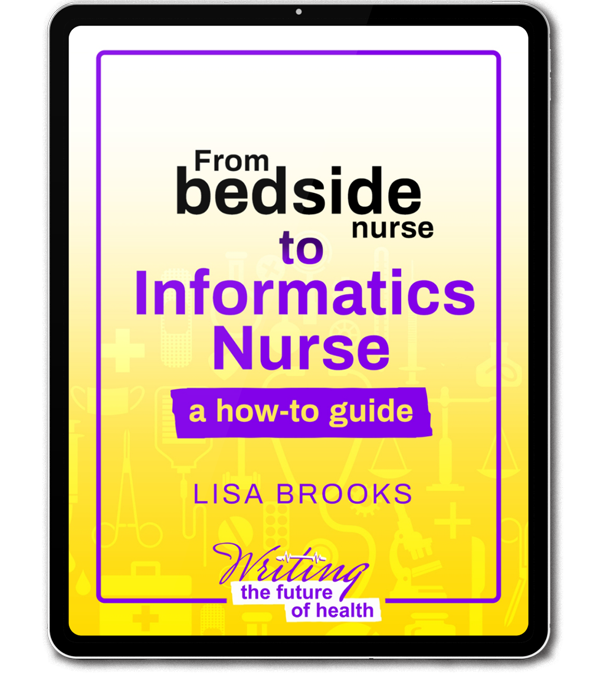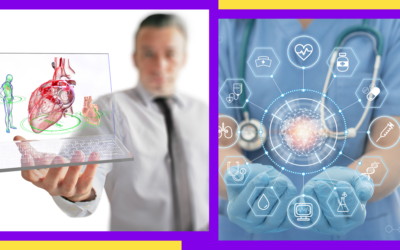Because Nursing Informatics is still a relatively new area, there are many nurses who have not heard of it. We need to change that because healthcare is only becoming more connected to technology. Our profession needs more nurses interested and willing to shape the future. While Nursing Informatics may not be the career path for every nurse, there are some key things nurses should know about Nursing Informatics.
Here are the top 5:

Thing #1: Nursing Informatics brings clinical perspective to technology
One of the easiest ways to understand Nursing Informatics is to think of it as a way to bring clinical perspective to technology. This is important because healthcare is complex, and technology is only effective if designed with an understanding of the problems to be solved. Nurses have a unique understanding of those problems.

Unfortunately, too many hospitals and technology companies are not including nurses in design and decision-making for health technology. A recent article reports most nurses would give the electronic health system they use a failing grade. Dislike of the electronic health system is linked to burnout for both nurses and doctors. Burnout is also linked to lower quality care for patients, so this is definitely an issue worth paying attention to.
Another startling piece of data: 98% of licensed nurses report never being included in hospital technology decisions. It should not surprise anyone if nurses find technology difficult to use if there were no nurses in the decision-making process.
This is why Nursing Informatics is so important. It is a field that bridges that gap between Nursing and technology. Informatics Nurses are nurses who understand clinical workflows, how technology fits into and improves those workflows, and what nurses at the bedside need to be effective.

Thing #2: Informatics Nurses work on a team
A lot of nurses find Nursing Informatics intimidating. They think it means they have to be experts in all things technology, which is simply not true.

Informatics Nurses work on technology teams. These teams include experts in different parts of technology, such as developers who write software code, testers who test that code and report bugs, and solution architects who design how systems will fit together. Most Informatics Nurses I speak to have never had to write code as part of their job.
Instead, our job is to understand what end users – nurses, doctors, and other healthcare providers – need and explain those needs to the rest of the technology team. We need to know enough about the technology to communicate effectively. But that means we need to understand how the technology will work for the end user:
- Which screens will they see?
- When will users see different pieces of information?
- Where can they find a function they use frequently?
We especially need to know what may be confusing or difficult to use. A key part of our role is to make life easier for other nurses.

Thing #3: The five main focus areas for Nursing Informatics
Since a major part of our role is communication, there are a number of tools and methods to help. I group these under five main focus areas:
Strategy Development: Because Nursing Informatics sits at the intersection of clinical and technical, we are key strategic partners in healthcare organizations. We help healthcare organizations develop strategy and future plans for the business. We may even lead strategy development sessions.
Project Management: This is one of the core sets of Nursing Informatics skills and responsibilities. Whether it is a small project to evaluate an inefficient process, or a large project to implement a new system for 10 hospitals, it comes down to the ability to organize tasks and dependencies, create a timeline, and manage risks and barriers.

Quality Improvement: One area that routinely employs Informatics Nurses is Quality Improvement. This is because technology can help to standardize processes, identify quality issues, and support regulatory reporting. Informatics Nurses are experts in marrying process improvement with technology.
Data Management: The term ‘informatics’ refers to the science of using and processing data. Using data to drive decisions is another core skill of Nursing Informatics. Data Science exploded in recent years, and many healthcare organizations employ a team of data experts, Informatics Nurses being one of them.
Learning and Change Management: Training is a key component to helping end users adapt to new systems and processes. Informatics Nurses may work in systems trainer roles, which is a common starting point for many into this field (I started there before I finished my degree).
You can learn more about these areas and other skills needed to become an Informatics Nurse in From Bedside Nurse to Informatics Nurse: A How-To Guide. This guide goes into depth on the tactical pieces of these areas, with examples of how to apply them in real life.

Thing #4: The key skill every Informatics Nurse must have – Communication
Informatics Nurses are responsible for the two-way communication between clinical and technical people. To do this, the Informatics Nurse must be able to communicate well both verbally and in writing.
Another common place for Informatics Nurses to start their careers is as business analysts. Business analysts look at processes and data to understand business requirements. Business requirements are simply what is needed to support the work a business unit performs. In the clinical context, an Informatics Nurse needs to understand clinical processes and data to understand the requirements for the healthcare organization they support.

It is important to document so technical team members can refer to them as they build the system. Informatics Nurses may be the ones writing and explaining these business requirements. This is why strong verbal and written communication skills are so important.

Thing #5: Informatics Nurses are measured differently
A recent interview with one of our upcoming Nursing Informatics Role Models brought up a good point about how Informatics Nurses are measured. The measurements are different than in clinical roles.
Nursing Informatics is not hourly work, it is work based on projects. That means the focus is on outcome and not the number of hours. The hours you work may be quite fluid, so you will be in charge of structuring your time.
Informatics Nurses are measured on delivery of the project. Part of that measurement is whether the project successfully concluded and gave the end users what they requested. But the other part is effectiveness – how well did the project meet the end users’ needs? That is not to say Informatics Nurses have to please everyone all the time. You will always have some end users who will just never be happy.

Lastly, because Informatics Nurses are part of a team, our measurement is with the team. Individual performance becomes less important than team performance. This is why building relationships and learning how to work with others is so important. If the team wins, everyone wins.

Key Takeaways:
The pace of change in healthcare is speeding up, powered by new technology. We need more nurses willing to engage with this technology, or we may find ourselves left behind. This is why there are basic things nurses should know about Nursing Informatics and what makes this field different.
If you are thinking about going into Nursing Informatics, one resources you can check out is our book, From Bedside Nurse to Informatics Nurse: A How-To Guide. In it you will find a straight-forward walk through of what Nursing Informatics is and why nurses should consider careers in health technology. You can find it in our online store.







0 Comments